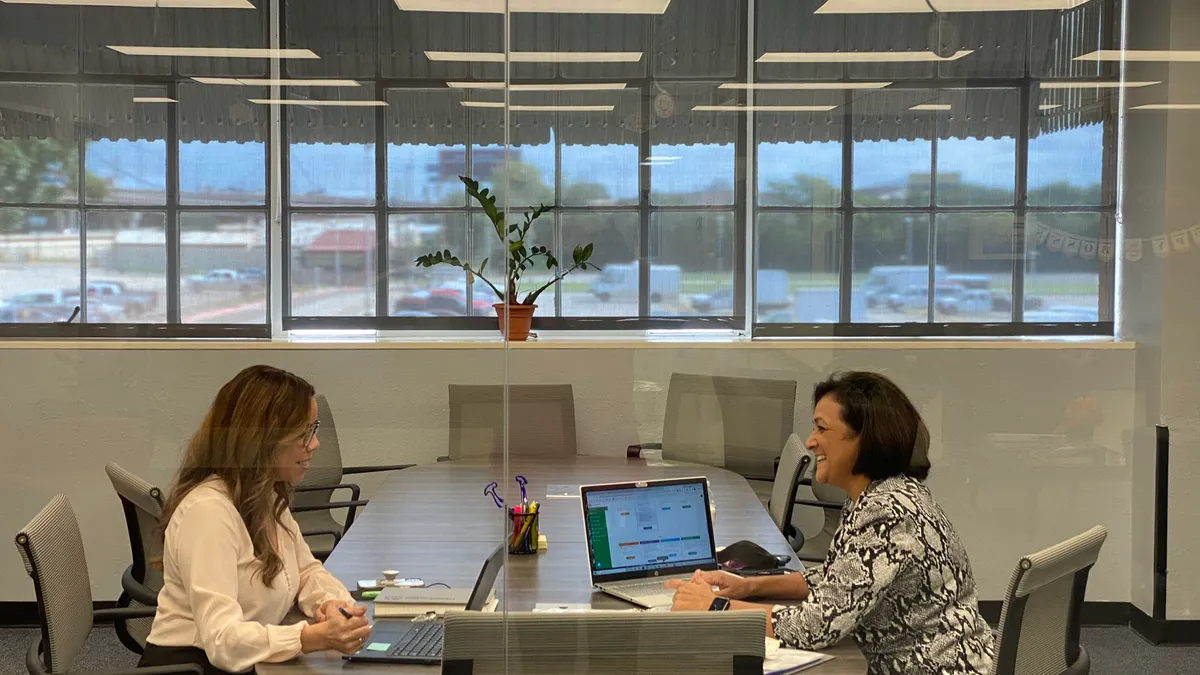Sixty-two days, or about two months.
That's how long the average response time was for maintenance calls seeking repairs or support three years ago in the Dallas Independent School District.
"It was terrible," said David Bates, assistant superintendent of maintenance and facilities for the Texas district. The response times were so bad that the district conducted an audit, which revealed the lengthy wait times and found the system had about 10,000 unfilled orders.
"We have well documented how bad we were," said Bates, who has worked in various departments in the district for 24 years.
There were several reasons for the lags in response time, but the main one was that the department lacked a good culture — or a passion — for helping, Bates said.
A multi-year effort to improve the department's culture, which began with individualized coaching for managers at the start of the 2021-22 school year, has already brought down unfilled work orders to 2,000 and average response time for maintenance calls to eight days.
These improvements were made even while the average number of daily work orders stayed at 268, said Bates.
The path to large-scale improvements like quicker response times, Bates said, can begin with small, incremental changes in the approach to individual staff goals like improving time management.
"But it's got to be intentional, and it's got to be consistent," he said.
The 'Core 4'
Pamela Lear, Dallas ISD chief of staff and racial equity, credits former Superintendent Michael Hinojosa for promoting positive cultures and attitudes when interacting with school stakeholders. A district mantra is “Core 4” — focused, fast, flexible and friendly — which guides employees' responses to the needs of students, families and each other.
The Core 4 was developed in the 2010s when the now 145,000-student school system began seeing declines in enrollment, Lear said. "One of the things he [Hinojosa] talked about was customer service, and having a culture … where parents felt like their kids are their treasure and they want to drop their kids off and feel like they are being taken care of," she said.
A positive climate and culture can assist with increasing student enrollment and recruiting and retaining staff, she said.
The Core 4 centers on the district's customer service expectations for its 22,000 employees and is used as a guide to help employees progress in exceeding expectations for customer service goals. Each of the Core 4 has a rubric for various competencies and expectations with the goal of working toward exceeding expectations.
"We wanted the whole organization — all 22,000 employees — to embrace and understand what these four words mean," Lear said.
Another helpful aspect is that in 2018-19, the district created a committee to align the district's values and expectations for customer service with the Core 4 rubrics, Lear said.
To get to a more personalized level, a pilot for individual coaching for 32 maintenance and facilities managers was initiated last fall. The district entered a $200,000 contract with engage2learn, a private company that works with school districts on professional development, to provide coaching for facilities managers during the 2021-22 school year.
Employees worked with individual coaches to better understand their current levels of progress and set goals for progress at each step. As employees advance through a rubric, they earn badges showing their progress. Lear noted the pride employees take in earning those badges, even displaying them as backgrounds in video calls.
Bates said having managers create their own pathways for progress, with help from their coaches, brought buy-in for the process. "It can't be forced," he said. "If you force it, it will never fit."
A 'responsible rollout'
The coaching will continue in the facilities department, with managers who got coaching last school year now planning to coach their direct reports next school year. The train-the-trainer efforts will expand until all 1,500 of the department's maintenance and facilities staffers have had personalized coaching.
It's a "responsible rollout," Lear said, with a goal of the district building capacity to have its own coaches.
For next school year, Dallas ISD has contracted with engage2learn to coach 86 lead front office managers in efforts to improve school front office services.
The front office staff "really are the ones who set the tone for the office at the school," Lear said.
Shannon Buerk, engage2learn founder and CEO, said the coaching is centered on the district's established Core 4 cultural tenets. Dallas employees and their coaches meet in person or virtually about seven times over a school year for about 45 minutes each time. Employees are asked to document evidence of progress toward practices and behaviors that align with the Core 4 competencies.
"Culture is not a fluffy thing. It's about tangible behaviors."

Shannon Buerk
Founder and CEO of engage2learn
For example, Buerk said that a lead office manager in Dallas, who already began working with a coach, wanted to make a school office more friendly to visitors. The coach and manager brainstormed to come up with an FAQ printed in several languages so visitors who do not speak English could communicate more easily with office staff. The FAQ is part of the evidence of progress toward the friendliness goal.
"It was really important to me that we find a way to measure growth so that we could recognize and celebrate growth, but also so that we can see what was really working and what wasn't working," Buerk said.
"Culture is not a fluffy thing. It's about tangible behaviors.”







 Dive Awards
Dive Awards












